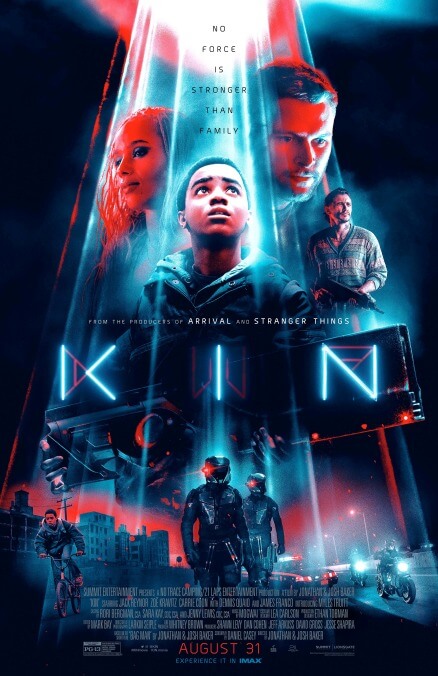Science-fiction filmmaking has become so consumed by “world-building”—that screenwriter buzzword for constructing elaborate and often pointless mythologies—that some big-ticket sci-fi/fantasy movies feel like they’d be better off spinning off some smaller elements into their own, more modest stories. That’s how Kin starts, and also why it takes so long to realize that the movie will refuse to work on its own terms.
Expanded from a short film by directors Jonathan Baker and Josh Baker, Kin follows Eli (Myles Truitt), a teenage kid making his way through a hardscrabble existence in urban-decaying Detroit, getting in trouble at school and ducking into abandoned buildings to scour for sellable wire, much to the chagrin of his stern widower father Hal (Dennis Quaid). Eli is adopted, a black kid in a fractured white family, and only feels more alienated when his miscreant brother Jimmy (Jack Reynor) returns from a lengthy prison sentence. Eli is also hiding a secret: Early in the film, during one of his wire-scrapping missions, he finds a bulky, mysterious gun alongside some futuristically outfitted corpses. The gun’s triggering mechanism seems to lock onto Eli’s biology, and he eventually realizes that he’s the only person who can fire it.
It’s a simple idea, to take this working-class family and introduce what amounts to a high-tech ray gun, but the hook is so effective that it buys Kin a fair amount of time before the story turns from scrappy to stupid. At first, it’s just a few details that ring false. Why, for example, would Taylor (James Franco), a gnarly gang leader in Detroit, agree to arrange for Jimmy’s in-prison protection for $60,000, not demand any of the money until Jimmy has served his full sentence, and then assume that Jimmy would be able to provide the money hours after his release? But soon, Eli and Jimmy are on the run from Taylor and his lackeys, and Kin starts compounding its bad decisions, like having Jimmy withhold a crucial piece of information from Eli for most of the running time as the audience waits for the hero to catch up with what it already knows. It’s a cheap way of generating conflict, as is the decision to make Milly (Zoë Kravitz), the film’s only major female character, an exotic dancer with a heart of gold and inexplicable instant loyalty to Jimmy.
As the newfound trio makes its way across the country with a car, a ray gun, and some money, Kin poses more questions than it answers, and they’re not the cool, speculative kind. Instead, they have to do with how the story mechanics break down and sometimes muck up the performances in the process: Why would a murder in Detroit turn up on a news broadcast in Nevada? Why does Franco, deep in his occasional ostentatious-psycho mode, create a more convincing portrait of grief than the similarly bereaved good guys? Why is Carrie Coon second-billed for what amounts to maybe eight minutes of screentime in the movie’s final stretch?
Another beloved actor turns up for a last-minute cameo, making clunky promises about amazing adventures to come. Plenty of good twist endings recontextualize what’s come before; this one reveals the best parts of the movie as part of a long con. The first half or so of Kin has enough visual polish, vividly strange details (like the dirtbag funeral Taylor holds for a departed family member), and attention to its characters’ emotional lives that it seems like the Baker brothers want to try their hands at something Spielbergian, fusing modern Americana with a mysterious sense of the uncanny to create an uncommonly human-scale sci-fi story. Instead, surprise! It’s a movie about the lengths to which filmmakers will go to seed a possible franchise.


 Keep scrolling for more great stories from A.V. Club.
Keep scrolling for more great stories from A.V. Club.